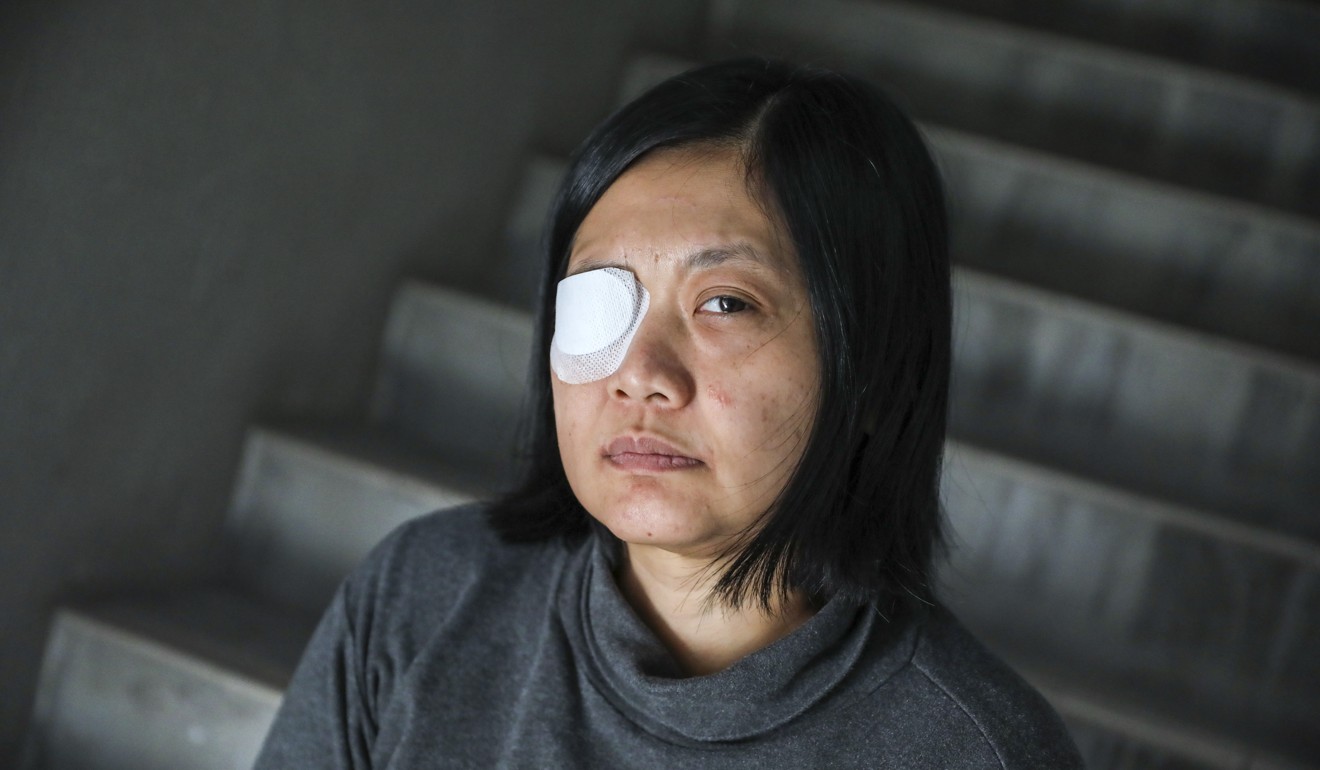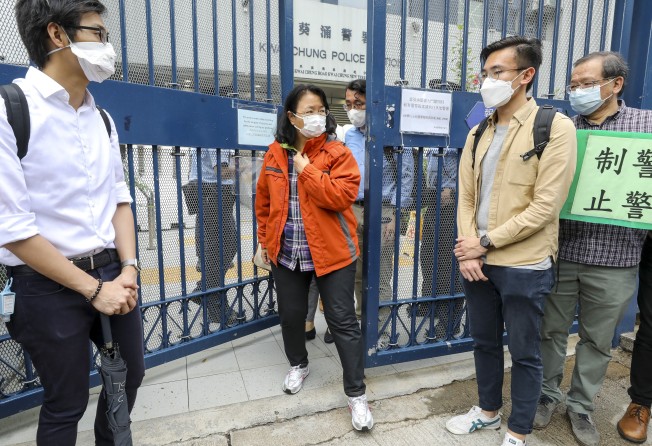
Hong Kong protests: opposition politician arrested under colonial-era offence of sedition after Facebook post about police officer
- Arrest of Cheng Lai-king, chairwoman of Central and Western District Council, came after she forwarded post with details of officer
- The offence in question has been rarely used over the past half-century

An opposition politician was arrested under the colonial-era offence of sedition early on Thursday morning, over an online post which criticised a police officer who shot a journalist, and called for “an eye for an eye”.
The force was also investigating whether Cheng Lai-king, who chairs Central and Western District Council, breached a court injunction banning the doxxing of officers and their families. Meanwhile, Cheng’s party colleagues decried what they said was an act of revenge over her recent clashes with police, as well as a wider crackdown against the opposition.
The 60-year-old was arrested a day after she forwarded – and later deleted – a Facebook post that detailed the name and identification number of an officer said to have shot an Indonesian journalist with a non-lethal projectile during an anti-government protest in Wan Chai in September. The post was reported by pro-establishment lawmaker Elizabeth Quat to the privacy watchdog, which then referred the case to the Department of Justice.
Cheng was released from a police station on HK$10,000 bail on Thursday afternoon.
Superintendent Swalikh Mohammed, of the cybersecurity and technology crime bureau, confirmed that a woman in her 60s was arrested on suspicion of seditious acts, over an online post linked to doxxing of an officer and his family.

The offence, which carries a punishment of two years in prison or a fine of HK$5,000 for the first violation, has been rarely used in the past 50 years.
“The case is still under investigation, and we will also study if she has contravened the Personal Data (Privacy) Ordinance and seek the Department of Justice’s advice on whether there is a [criminal] contempt of court for violation of two High Court interim injunction orders,” Mohammed said.
He did not spell out the alleged seditious intent involved, but mentioned potential incitement of “hatred or violence”.
Cheng, a member of the Democratic Party, wrote in the post on Wednesday: “If this officer still has good conscience, please turn yourself in. An eye for an eye!” She was arrested during Thursday’s early hours from her home in Kwai Chung.
Cheng refrained from commenting after her release, citing legal reasons.
In a statement, the Democratic Party strongly condemned the arrest, accusing police of “abusing the law” and calling the incident “a flagrant act against freedom of speech with an intent to create a chilling effect in society”. It added that it believed the force was targeting councillors who were monitoring its behaviour.
Fellow party member and legislator Ted Hui Chi-fung, pointing to Cheng’s clashes with police at district council meetings, said:“Police are probably using public office to avenge private wrongs.”
Mohammed denied any political consideration, and stressed that doxxing of officers could come under criminal contempt as laid out in two injunctions orders.
“Doxxing is not just a threat to the officer or family, but also to social order. It silences [people], which could affect public faith in the rule of law,” he said.
Police would not rule out making more arrests for cases of similar nature, he added.
The crime of sedition passed into law in 1938, during the British colonial era. The offence prohibits seditious acts or even the use of “any seditious words”. Last amended in the 1970s, it has been used rarely since the 1967 riots.
Seditious intention is defined broadly under the law as to “bring into hatred or contempt or excite disaffection against” the government, or “to incite other persons to violence”.
Police have cited Cheng’s demand that the officer turn himself in and declaration of “an eye for an eye” as incitements to violence, a legal source said.
But the law also defines speech or acts as non-seditious if they aim to “point out errors or defects in the government … with a view to the remedying of such errors or defects”, or to persuade people to change the situation by lawful means.
Criminal law scholar Peter Chau Siu-chun of the University of Hong Kong said if the city followed Britain’s previous legal position, prosecution had to prove there was an intention to incite violence. Britain abolished the offence of sedition in 2009.
He cited a 1977 Law Commission working paper, where a British newspaper editor was in 1947 acquitted of sedition, despite suggesting violence could be the only way to bring the Jewish in Britain to a sense of responsibility to the country of their residence.
Without comment on the case, Chau said the remark of “an eye for an eye” could be interpreted in more than one way.
“One interpretation is retribution for justice to be done, but it could also mean doing justice inside the system, so this does not necessarily involve inciting violence,” he said.
In 1996, ahead of the handover, both the Hong Kong Bar Association and the Hong Kong Law Society supported the offence’s abolition, the former saying the law was not in keeping with modern values of freedom of thought, expression and political rights.
After Hong Kong returned to Chinese rule, the UN Human Rights Committee has repeatedly criticised the sedition offence as being too broad and requiring replacement.
Former security minister and lawmaker Regina Ip Lau Suk-yee however said she did not see any problem in using the sedition law, as the legality of cases would eventually be decided by the courts.
“The offence hasn’t been used for decades, but without a national security law [in place yet], we can only resort to that law,” Ip said, referring to the city’s responsibility to enact a national security law under the Basic Law, its mini-constitution.
Cheng, who has held her seat on the council since 1994, became chairwoman after the pro-democracy camp’s landslide victory in local elections last November.
She won praise from allies when she chaired a meeting in January, which police chief Chris Tang Ping-keung attended, where she ordered officers who did not wear their identity cards to leave the room.
The High Court granted an interim injunction in October to help protect police from harassment by banning the publication of officers’ personal details amid months of increasingly violent anti-government protests.
Veby Mega Indah, the journalist shot in the September incident Cheng was referring to, was left blind in one eye. She has taken legal action to force the police commissioner to reveal the identity of the officer.
Purchase the China AI Report 2020 brought to you by SCMP Research and enjoy a 20% discount (original price US$400). This 60-page all new intelligence report gives you first-hand insights and analysis into the latest industry developments and intelligence about China AI. Get exclusive access to our webinars for continuous learning, and interact with China AI executives in live Q&A. Offer valid until 31 March 2020.